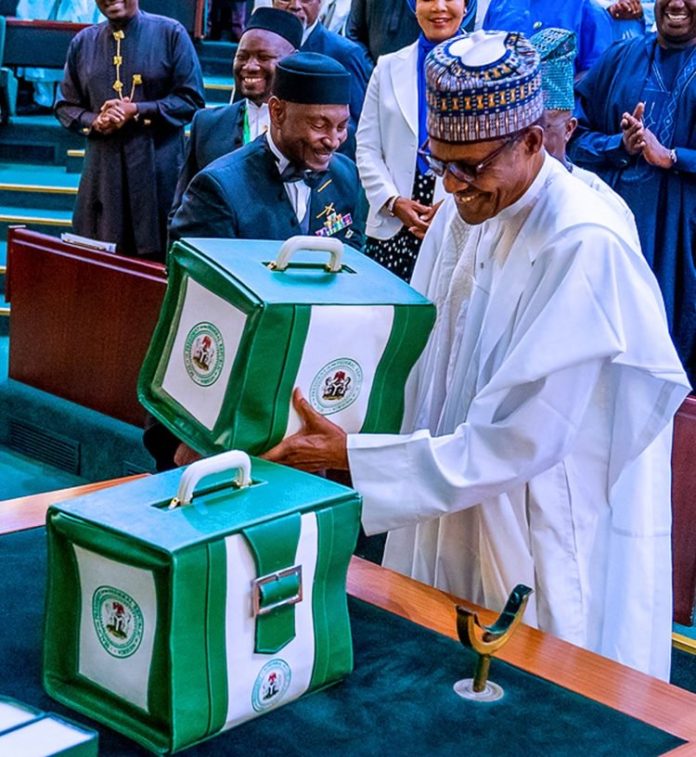By Dr. Boniface Chizea
On Tuesday October 8, 2019 President Buhari presented to a joint session of the National Assembly (NASS) the details of the above Budget which is named; ‘Budget of Sustaining Growth and Job Creation.’ The first thing that struck someone is to ask what level of growth we are sustaining. At a projected growth of 2.9 per cent which is still below our purported population growth of about 3 per cent we are still a long way from the desired level of growth which ideally should be in the range of 6 to 9 per cent if commensurate impact is to be made on the prevalent levels of unemployment with the need for rapid poverty alleviation. The aggregate expenditure for the 2020 Budget is now N10.33 trillion at some point in time this total expenditure was almost a moving target.
There are immediately two remarkable take away from the Budget presentation. One was the good spirit, the banter and camaraderie atmosphere that hallmarked the Budget presentation contrary to the rancor, recrimination and bad spirit that was the case last year. In fact one must also quickly add the heckling, shouting, name calling and general demeaning behavior. The other remarkable development surrounding the presentation of the Budget was the timing of the presentation. For the first time in a long while we witnessed Budget presentation not in December or early January but actually in October! You would have to pinch yourself to confirm that you are not living in dream land.
The President had repeatedly assured all that cared to listen that he would harmonize the Budget year with the calendar year. And he is now all set to deliver on this promise and he pulls this off and we are able to sustain it, we must then put this down as one of the legacies which this President had bequeathed to this country. What happened in the past was very shameful and rather unbecoming for a country the caliber of Nigeria; the reputed largest economy in Africa. In reality there was no ascertainable budget year as budget implementation commenced whenever the Budget was approved which in reality was often in the second half of the year which situation not only projected us as unserious but made particularly Capital Budget implementation a nightmare and largely accounted for the lack of commensurate growth of the economy. Little wonder unemployment became a veritable growth sector with the consequent rise in social crimes.
We are now poised to realize the January to December Budget year as all stakeholders have demonstrated their resolve for this to happen leveraging on the existing cordial relationship between the Executive and the Legislature. The NA has closed plenary sessions to now work in relevant committees to interact with the Ministries, Departments and Agencies (MDAs) for speedily presentation and approval of their respective budgets and so bye to the previous, often heard name calling and posturing with the Legislature claiming that their work was being delayed because government agencies have refused to attend to defend their budgets.
But we have been on record with the recommendation that we could dispense with this unnecessary aspect of the budget approval process. It is a duplication and an abuse of due process for accepted best practice in reporting. Those agencies do not report to the NA and have prior made their submissions to the Executive which approved them after due defense before inclusion in packaging of the National Budget. And the experience has been that this is the window which is seized to arm twist the agencies to make provisions for third parties in their budget. So we invite the President to use his good offices and leverage on the existing cordial relationship to expunge this stage in the budget approval process going forward.
A growth rate of 2.9 per cent has been assumed. Whether this is attainable is in the womb of the future. A growth rate of 2.02% has been reported as recorded in the first half of 2019. With early passage of the Budget so implementation could commence early and with the aggressive revenue drive now mounted, there is good expectation that an improvement in growth rate is well on the cards. What remains certain is that we must devise a means to record far higher growth rates close to a range of 6 to 9 percent if the economy is going to get out of the woods, jobs created and poverty alleviated in not distant future. And this goal is not farfetched with consistent disciplined and focused implementation of the policies and programs in the budgets. There will also be the need to plug all leakages to minimize misappropriations. The instruction in the Budget that all workers must be registered on integrated payroll and personal information is therefore a move in the desired direction.
The assumptions in the Budget appear mostly realistic. An oil benchmark of 57 dollars per barrel has been used with a daily production level of 2.18 million barrels per day (mbpd). Oil price we have been informed averaged 67 dollars last year with a daily production level of 1.86 as at end June, 2019. Therefor for this benchmark it is certain that we have erred on the side of caution. It must be recalled that the Executive submission was at 55 dpb and it was the Legislature that hiked the price up to the existing 57 dollars with comments being now made to the effect that this price should be further increased during the review; the legislature should take over the Budget from the executive as the allocation to Capital expenditure is not adequate to facilitate the level of growth required to jumpstart the economy for the much awaited growth in job opportunities. We caution against such sentiments as it could contaminate the good relationship we have so far celebrated. The responsibility for Budget preparation remains exclusively that of the Executive. The foreign exchange rate of 305 to the dollar assumed in the Budget is cautionary as this is the Base Exchange rate and therefore exchange rate above this rate would be a bonus as it generates greater dollar inflows. But with the newly inaugurated Economic Council, this rate might not survive for too long.
The challenge on the Expenditure side of the Budget is real. With recurrent expenditure of about 70 per cent of total expenditure, there is not much scope to rapidly grow the economy. It is unfortunate that the relative balance between capital and revenue expenditure with all the gains made to redress these relative rates in favour of Capital expenditure in the recent past would now seem to have been lost. The creation of five new ministries; power, aviation, Special duties and International affair, Police affairs and Humanitarian affairs, Disaster management and social development definitely has compounded the situation. Also the provision for the new minimum wage and enhancement of the salaries and wages of the Police and armed forces have also added to the problem. The capital budget at 2.14 trillion Naira against a debt service provision of 2.45 trillion higher than the capital budget illustrates the extent of fiscal sustainability dilemma confronting the country. It has also been estimated that above 60% of revenue inflow is now used to service debts and therefore the challenge of growing revenue could not have been more pressing and urgent. It is in this context that the proposed increase in VAT rate must be accommodated by all even if we must note that VAT rates in Nigeria are the lowest when compared with rates elsewhere in the world.
Sectorial capital allocations have presented some challenges. An allocation to education of 48 billion Naira even if there is the consideration of an additional allocation of 112 billion to Universal Basic Education would seem to be inadequate considering the importance of education for the future prosperity of the country. The economy of the future is the one that leverages on automation, robotics and artificial intelligence and no longer on the extractive sector. Also an allocation to the health sector of 46 billion offends all protocols which the country has subscribed to in this respect as it represents a far lower percentage allocation. But we must observe that in these matters there are no quick fixes. We must for now be content with achieving a measure of progress with the implementation of the budget to build on that as we make gradual progress while we offer supplications for the possibility of the realization of the harmonization of the budget and calendar year now staring us on the face.
Dr. Chizea, an economist, wrote in from Lagos













